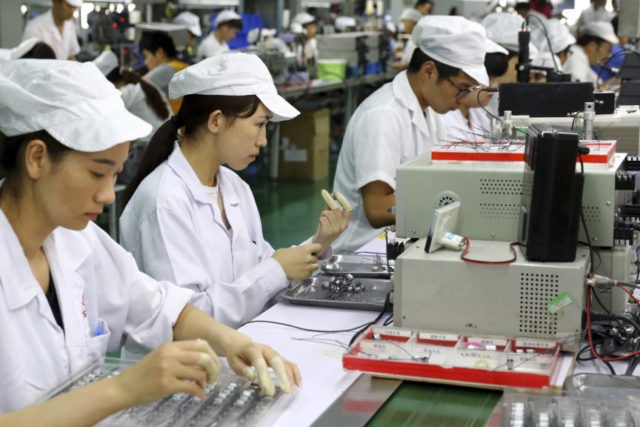China’s state-run Global Times newspaper warned Chinese corporations on Thursday that they should “temper their enthusiasm” and “be cautious” when investing in North Korea – not because North Korea is an unreliable communist rogue regime, but because the United States may sanction them.
The Times warns that, should Chinese companies profit from greater business ties with North Korea, American President Donald Trump may use them as “scapegoats” and target them for enriching the regime of dictator Kim Jong-un.
China is already North Korea’s largest trading partner, responsible for over 90 percent of North Korea’s trade. Following a meeting between President Trump and Kim in June, speculation grew that, should North Korea end its illegal nuclear program, the United Nations would move away from the unprecedented global sanctions currently stifling Kim’s economy, banning trade in North Korean coal, iron ore, and seafood, among other products. An end to those sanctions would open up much of the North Korean market to the rest of the world. China, as North Korea’s closest political ally, would likely have the best access to those markets.
“Chinese investors are paying close attention to North Korea’s economic situation in search of potential business opportunities, but they may have to temper their enthusiasm,” the Global Times warned on Thursday. “Chinese companies need to take a cautious approach on investment toward North Korea before sanctions are lifted.”
The story cites no concerns regarding the lawless nature of the Kim cult, which has governed North Korea since dictator Kim Il-sung established North Korea following the Korean War. Kim Jong-un has proven more skeptical of China than his predecessors, his grandfather and father Kim Il-sung, killing his uncle Jang Song-thaek and half-brother Kim Jong-nam since assuming the role of head of state. Both were considered sympathetic to the communist regime in Beijing. Last year, in what appeared to be a new low in the China-North Korea relationship, North Korean state media disparaged China, without naming the country, as a former “friendly” ally that had become a “U.S. vassal force.” Kim Yo-jong, Kim Jong-un’s sister, is believed to run North Korea’s Propaganda and Agitation Department, making her responsible for all state media.
Instead of warning about North Korea, the Chinese publication warns that the United States may target businesses dispropotionately enriching Pyongyang.
“While Trump has touted his summit with North Korea leader Kim Jong-un as a huge success, U.S. policy toward North Korea still remains uncertain,” the newspaper argues. “Washington will probably seek to exert its influence on the UN decision regarding sanctions relief, so there is not much chance that economic restrictions could be lifted very soon.”
The Global Times notes that ZTE, the Chinese corporate giant at the center of discussions on a trade deal between the two countries, is facing nearly one billion in fines in the United States for doing business with North Korea and Iran, also heavily sanctioned under American law. “As trade friction between China and the U.S. continues to escalate, it’s possible that Chinese companies’ businesses in North Korea may become scapegoats for hostile U.S. trade protectionism,” the publication warns, adding a note not to act “rashly” in investing in North Korea.
“There’s no need for Chinese companies to rush to invest in North Korea. They will have enough time to take action,” the newspaper demanded.
Reports surfacing following the June 12 Trump-Kim summit suggest that some Chinese businesses – and local Chinese governments on the border with North Korea – may be doing just that. North Korea’s annual international trade fair this year attracted dozens of Chinese companies, that expressed interest following not just Trump’s meeting with Kim but Xi Jinping’s second of three meetings with the dictator in Dalian, a northern seaside city. Air Koryo, North Korea’s official airline, is reportedly expanding its list of itineraries to North Korea, while government officials in border towns like Jilin have reportedly begun replacing arrests with fines in the case of sanctions violations on the border, failing to confiscate smuggled items and letting them into China.
The Global Times itself suggested shortly after the Trump-Kim summit that North Korea was a prime candidate to be colonized by China’s One Belt, One Road (OBOR) project, a sprawling infrastructure development scheme designed to give China control to the world’s largest and most important ports, roads, and railways.
Both President Trump and Secretary of State Mike Pompeo have repeatedly insisted that the United States will not lift sanctions on North Korea without proof of the complete denuclearization of the country.

COMMENTS
Please let us know if you're having issues with commenting.